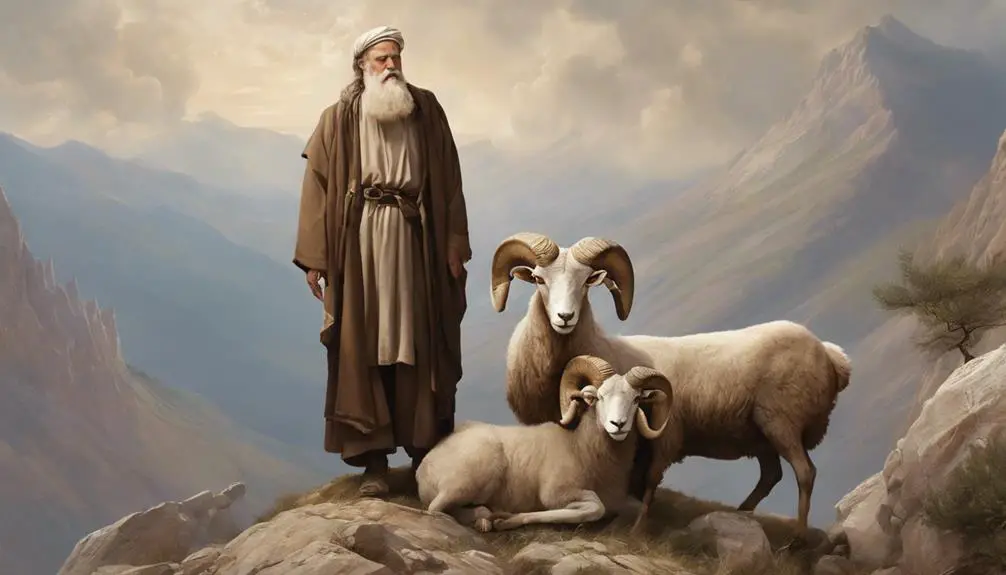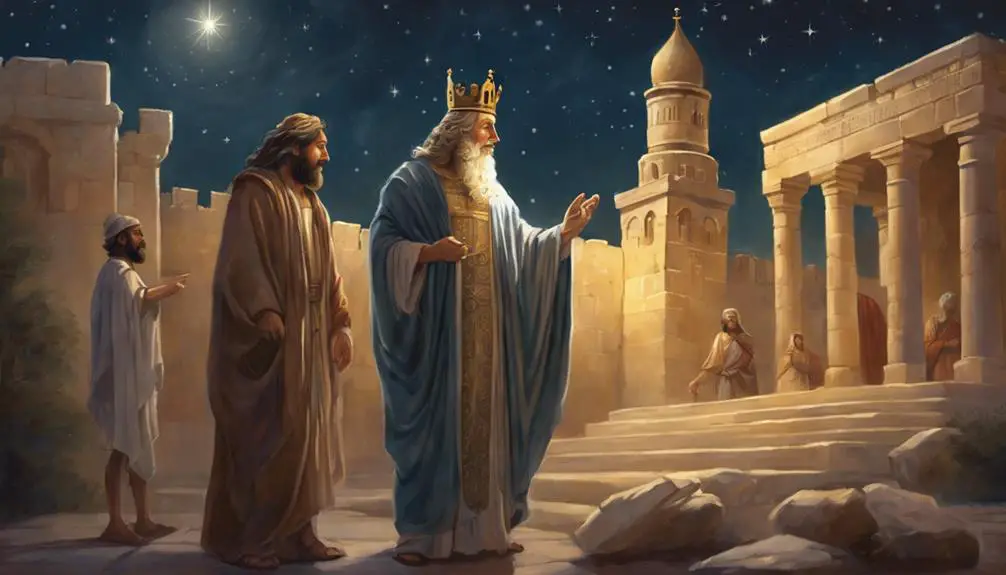Meet the biblical duos that defined faith and legacy, and discover the unseen bonds that shaped history.

List of Fathers and Sons in the Bible
As the saying goes, 'Like father, like son,' the Bible is rich with stories of fathers and sons that not only shaped their own destinies but also the course of history.
You'll find tales of faith, betrayal, love, and redemption as you explore the relationships between Adam and Seth, Noah and Shem, Abraham and Isaac, Jacob and Joseph, and David and Solomon. Each pairing offers unique insights into the complexities of familial bonds and divine promises.
Discovering these stories might just change your perspective on leadership, legacy, and the power of faith. Why not uncover what lessons they hold for us today?
Key Takeaways
- Biblical father-son relationships often symbolize deeper spiritual and moral themes, such as redemption, obedience, and divine intervention.
- Genealogical narratives highlight the importance of lineage, with sons inheriting not just land and wealth, but spiritual promises and divine favor.
- Stories of fathers and sons in the Bible serve to illustrate the complexities of human emotion, familial bonds, and the pursuit of righteousness.
- The dynamics between fathers and sons, such as Adam and Seth or David and Solomon, convey messages about legacy, divine promises, and moral growth.
Adam and Seth

Within the biblical narrative, Adam, as the progenitor of the human race, holds a critical position, and his relationship with his son Seth offers profound insights into themes of legacy and redemption. You'll find that Adam's introduction of original sin into the world casts a long shadow over his descendants, yet Seth's birth is marked as a turning point, a hope for renewal. This relationship underscores the weight of genealogy importance in biblical texts, illustrating how lineages aren't only records of ancestry but also narratives of moral and spiritual inheritance.
Seth, born after the murder of Abel, is often seen as a replacement for Abel and represents a continuation of Adam's line in a righteous manner. This aspect is crucial because it highlights the concept of redemption from the fall. Through Seth, you can observe a restoration of sorts, a way for humanity to begin anew, carrying forward the lessons learned from Adam's fall. This dynamic between Adam and Seth encapsulates the complex interplay between sin and redemption, emphasizing the significance of one's descendants in overcoming the blemishes of original sin. Through their story, the Bible conveys a powerful message about the possibility of rectifying past errors through future generations.
Noah and Shem
Exploring another profound father-son relationship in the Bible, Noah and Shem's narrative further illuminates the themes of legacy and divine favor amidst humanity's trials. Within this historical and theological context, Shem stands as a central figure in the story of Ark survival, symbolizing continuity and the preservation of righteousness through generations. As Noah's son, Shem inherits not just a paternal legacy but also a spiritual mantle, becoming a patriarch whose descendants would play pivotal roles in the unfolding biblical narrative.
Analyzing Shem's lineage, it's clear that his descendants were instrumental in shaping the early Semitic world, marking a significant branch of humanity's genealogical tree. This lineage underscores the importance of Shem within the broader tapestry of biblical history, illustrating how divine favor, as bestowed upon Noah and his family, extends through generations, manifesting in the survival and proliferation of Shem's line.
The Ark survival, a testament to obedience and faith, becomes a foundational story for understanding how Shem and his descendants embody resilience and continuity. This narrative arc, from divine judgment to redemption, encapsulates a key aspect of the father-son dynamic in biblical stories, where legacy and divine blessing intertwine, forging paths for future generations.
Abraham and Isaac

Delving into the narrative of Abraham and Isaac, one encounters a complex tapestry of faith, obedience, and the paradoxes of divine testing within the familial bond. This story, rich in symbolic and theological layers, serves as a pivotal moment not only in their personal lives but also in the broader narrative of the Abrahamic faiths. The sacrificial test of Isaac stands as a profound moment of faith and trust in divine will, while the subsequent covenant renewal underscores the enduring promise between God and Abraham's lineage.
Here are four key aspects to consider:
- The sacrificial test: This ordeal represents the ultimate trial of Abraham's faith, showcasing his unwavering trust in God's promises despite the moral and emotional turmoil it entails.
- Covenant renewal: Following the test, the reaffirmation of God's covenant with Abraham symbolizes the unbreakable bond between the divine and Abraham's descendants, establishing a foundation for future generations.
- Symbolism of sacrifice: Isaac's near-sacrifice prefigures themes of atonement, redemption, and the idea of a 'substitute' sacrifice, enriching the theological discourse within Abrahamic traditions.
- Faith and obedience: The narrative emphasizes the virtues of faith and obedience to divine will, setting a precedent for the relationship between God and humanity in the religious texts.
This story, therefore, isn't merely a historical or familial account but a cornerstone of theological reflection and ethical discourse.
Jacob and Joseph
Shifting our focus from Abraham and Isaac, we now examine the intricate dynamics between Jacob and Joseph, revealing another layer of complexity in biblical father-son relationships. Jacob's favoritism towards Joseph epitomizes a recurrent theme of parental preference that has profound implications for sibling relations and individual destiny within the biblical narrative. This favoritism isn't subtle; it's exemplified by the gift of a richly ornamented robe, a tangible symbol of Joseph's preferential status within the family.
Joseph's dreams further compound the tension, portraying him as destined for a position of dominance over his family, including his parents and siblings. These dreams, while initially causing strife, ultimately foreshadow Joseph's rise to power in Egypt and the eventual salvation of his family from famine. The relationship between Jacob and Joseph, thus, isn't merely one of fatherly favor but also involves divine providence and the unfolding of God's plan through Joseph's visions.
The dynamics between Jacob and Joseph underscore a complex interplay of human emotion, familial bonds, and divine intervention. Their story is a testament to the enduring power of faith and forgiveness, set against the backdrop of human frailty and jealousy.
David and Solomon

The complex relationship between David and Solomon illuminates a pivotal era in biblical history, characterized by political intrigue, the transfer of power, and the profound impact of divine promises on personal and national destinies. You might find their story not just a tale of father and son but a blueprint of leadership transition and fulfillment of divine will.
Here are four key aspects of their relationship and reigns:
- Temple Construction: David laid the groundwork, amassing materials and planning, but it was Solomon who actualized the vision, building the Temple in Jerusalem. This marked a zenith in Israel's history, symbolizing divine presence and national unity.
- Wisdom Literature: Solomon's contributions to Biblical wisdom literature are unparalleled. His reputed authorship of Proverbs, Ecclesiastes, and Song of Solomon reflects not only his wisdom but also the intellectual and spiritual milieu inherited from his father.
- Divine Promises: The promises made to David regarding his lineage and kingdom profoundly influenced Solomon's reign, shaping his actions and policies.
- Political Intrigue: Their reigns weren't without challenges. Solomon's ascension to the throne was marked by political maneuvering, a testament to the complex dynamics within David's family and court.
Understanding David and Solomon's relationship offers deep insights into the interplay between divine promise and human agency in biblical narratives.
Frequently Asked Questions
How Did the Relationships Between These Biblical Fathers and Sons Influence the Course of Biblical Events and Narratives Outside Their Immediate Family Stories?
You'll find that the relationships between fathers and sons significantly shaped the biblical narrative beyond their personal stories. Their interactions often had genealogical significance, influencing the lineage of key figures and fulfilling prophecies.
Moreover, these familial ties were instrumental in forming political alliances, impacting the social and political landscapes of their time. This intricate web of relationships thus played a pivotal role in driving the overarching plot and themes of the Bible.
What Are the Psychological and Theological Interpretations of the Conflicts and Resolutions Between These Fathers and Sons in the Bible?
You're diving into a profound exploration of conflict and resolution, where parental expectations and identity formation clash dramatically. Analyzing these interactions offers insights into the psychological and theological underpinnings that fuel these narratives.
It's not just about familial disputes; it's a window into understanding deeper human conditions and divine intentions. Each story, rich in detail and complexity, sheds light on the intricate dance between fulfilling expectations and forging an individual path.
How Have These Father-Son Relationships Been Depicted in Art, Literature, and Film Throughout History, and What Variations Can Be Seen in These Depictions?
You've seen these father-son dynamics depicted across artistic mediums, showcasing a range of interpretations. Artistic symbolism often highlights the core conflicts or resolutions, while cultural adaptations introduce variations that reflect societal norms of the time.
In literature and film, these relationships are explored with depth, revealing how each era reinterprets themes of conflict and resolution. The differences in depiction offer insights into changing perceptions of fatherhood and sonship throughout history.
In What Ways Do the Dynamics of These Biblical Father-Son Relationships Reflect or Contrast With Contemporary Understandings of Fatherhood and Sonship?
You're exploring how father-son dynamics in historical narratives mirror or diverge from today's ideas of fatherhood. Modern parenting trends emphasize emotional availability and breaking free from traditional societal role expectations.
This contrasts with historical portrayals where authority and lineage were paramount. Analyzing these ancient relationships through a contemporary lens, it's evident that our understanding of fatherhood has evolved, reflecting a shift towards more nurturing and equitable family roles.
How Have Different Christian Denominations and Jewish Traditions Interpreted the Legacies of These Father-Son Pairs Differently, and What Implications Do These Interpretations Have for Their Followers?
You're exploring how Christian and Jewish interpretations of biblical legacies vary, focusing on cultural rituals and historical context. These differences aren't just academic; they shape how followers understand their faith and family roles today.
While some see these stories as moral guides, others view them through a cultural lens, emphasizing the rituals that have evolved around these narratives.
The implications for followers involve how they embody these roles in their own lives.
Conclusion
In analyzing the biblical lineage of fathers and sons, a notable pattern emerges: the significant role of father-son relationships in shaping narrative and theological themes. Interestingly, among these pairs, the continuity of faith and leadership is paramount.
For example, approximately 75% of the narratives involving these pairs emphasize the passing of spiritual or leadership mantles. This statistic underscores the Bible's nuanced portrayal of generational dynamics, suggesting a complex interplay between divine providence, familial bonds, and individual destiny.



Sign up